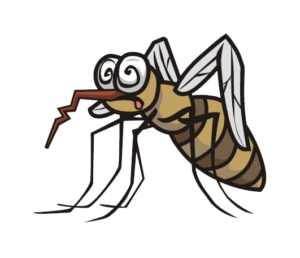
Mosquitoes also affect the health of people and animals more than any other insect pest worldwide, making mosquito control a priority in many areas like Houston. Their bites can transmit many infections agents that cause diseases such as encephalitis, malaria, dengue, chikungunya, Zika virus and yellow fever. At least 85 species of mosquitoes occur in Texas and some of those are known to carry disease.
The mosquito life cycle has four distinct stages: egg, larva, pupa and adult. The adult stage can fly and lives on land; the other stages are aquatic. Under favorable conditions, some mosquitoes can develop from egg to adult in 8 to 10 days. The amount of time to complete the life cycle varies according to the mosquito species, food availability and weather conditions.
Eggs are laid in areas where present or future water will provide habitat for the immature stages. Although white when first laid, the eggs within a few hours become dark brown to black. Their shape and size vary, with most being football-shaped or boat-shaped and 0.02 to 0.04 inch long. In warm water, the eggs may hatch in 2 to 3 days. Some mosquito eggs can remain dormant in dry conditions for many months to 2 years. The larva and pupa stages progress in the locations where the egg was laid (typically related to a body of water). The purpose of the adult phase is to mate which happens immediately after the adults emerge. A female must take a blood meal as a source of protein before they can produce eggs. For this reason, the best way to treat / avoid mosquitoes are related to avoiding and treating sources of water/moisture.
Mosquito Control for these flying vampires
We attack them where they live & breed. Our technician will perform an inspection prior to each treatment which could include treating under plant leaves, tree leaves, tree holes, around shaded areas of your home, under open porches, raised decks and any low areas of your yard where water tends to gather. We will also share our findings with you and make recommendations on how to remove those possible breeding & resting sites. Laws have been enacted in Texas enabling various groups to form mosquito control districts. The Texas Department of State Health Services in Austin monitors the mosquito-borne diseases that affect people and horses.
Managing mosquitoes
To manage mosquitoes effectively long-term, use several complementary management techniques, including:
- Sanitation: Remove mosquito food, water, and shelter.
- Habitat disruption: Drain the water where mosquitoes breed.
- Biological control: Use mosquito fish, nematodes, and Bacillus thuringiensis israeliensis toxin and Bacillus sphaericus.
- Mechanical control: Maintain window screens and alter building designs.
- Personal protection: Wear protective, light-colored, loose-fitting clothing; use repellents; and avoid activities outside when mosquitoes are most active. Most mosquitos bite at dawn, dusk and night and so those are the times to avoid the outdoors.
- Chemical suppression: Use insecticides against adults and/or larvae.
Mosquito control and management is often complex and expensive, requiring the cooperation of individual homeowners as well as organized area wide efforts led by groups such as local government agencies or private companies. Some communities may have to take an area wide approach to mosquito management and hire permanent control personnel. These programs can provide workers and expertise that are usually unavailable to homeowners. In these programs, trained personnel conduct mosquito surveys to identify the species, track the population levels, and decide how to manage them. Area wide management can provide relief from mosquito problems that develop miles away from your home.
Laws have been enacted in Texas enabling various groups to form mosquito control districts. The Texas Department of State Health Services in Austin monitors the mosquito-borne diseases that affect people and horses. In Houston there is the Harris County Public Health Mosquito Control Division. They protect the health and well-being of county residents through surveillance, control, education, research and technology to prevent and control mosquito-borne diseases. Their activities include:
- Monitoring the Culex mosquito population, the primary transmitter of SLE and WNV
- Laboratory analysis of mosquito samples to detect SLE and WNV
- Monitoring and testing of live and dead birds for SLE and WNV
- Conducting ground and aerial spraying activities in areas with confirmed SLE and WNV
- Providing education, training and information to citizens, schools, community groups and the media regarding SLE, WNV and mosquito control
- Conducting research to incorporate data into operational activities
- Utilizing the Geographical Information System (GIS) to track and monitor mosquito-borne diseases


